 Petzlover
Petzlover Brug is originated from United States but Bulgarian Shepherd is originated from Bulgaria. Brug may grow 29 cm / 11 inches shorter than Bulgarian Shepherd. Brug may weigh 46 kg / 101 pounds lesser than Bulgarian Shepherd. Brug may live 42 years less than Bulgarian Shepherd. Brug may have less litter size than Bulgarian Shepherd. Brug requires High Maintenance. But Bulgarian Shepherd requires Moderate Maintenance
Brug is originated from United States but Bulgarian Shepherd is originated from Bulgaria. Brug may grow 29 cm / 11 inches shorter than Bulgarian Shepherd. Brug may weigh 46 kg / 101 pounds lesser than Bulgarian Shepherd. Brug may live 42 years less than Bulgarian Shepherd. Brug may have less litter size than Bulgarian Shepherd. Brug requires High Maintenance. But Bulgarian Shepherd requires Moderate Maintenance
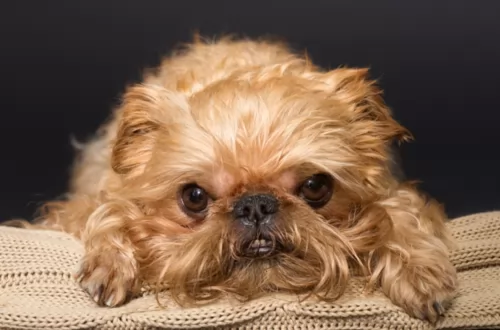 The Brug or Griffon Pug is not a purebred dog at this point in time. It is a cross between a Pug and a Brussels Griffon, currently known as a “designer dog” or a hybrid. This hybrid is really rare at this time but growing in popularity and breeders. Its exact history or original development is unknown at this time and needs to be researched as the hybrid develops into a breed, or breed clubs are formed. If you like either of the two breeds involved, you are sure to like the Brug. They are obviously not recognized by the major kennel clubs, but they are registered with a variety of hybrid/designer dog clubs. These include:
The Brug or Griffon Pug is not a purebred dog at this point in time. It is a cross between a Pug and a Brussels Griffon, currently known as a “designer dog” or a hybrid. This hybrid is really rare at this time but growing in popularity and breeders. Its exact history or original development is unknown at this time and needs to be researched as the hybrid develops into a breed, or breed clubs are formed. If you like either of the two breeds involved, you are sure to like the Brug. They are obviously not recognized by the major kennel clubs, but they are registered with a variety of hybrid/designer dog clubs. These include:
 The Bulgarian Shepard Dog comes from the ancient line of Molossers of Central Asia and Tibet, and the shepherds of the Balkans, Turkey and Caucasus. Among the oldest and most valued of the working dogs of Europe, the Bulgarian Shepherd breed was created by mixing the Balkan breeds with the dogs from Central Asia by the proto-Bulgarians around the 7th century. The Karakachanskoto Kuche was introduced to Bulgaria and accepted by the sheep herders. Mixing this breed in with the Balkan and Central Asian mix developed the Bulgarian Shepherd we know today. In the long run the original Karakachanskoto Kuche became extinct, replaced entirely by the Bulgarian Shepherd even in places where the new breed is still called by the Kuche name. Although the breeds are not the same, most of the dog world does not know the difference.
The Bulgarian Shepard Dog comes from the ancient line of Molossers of Central Asia and Tibet, and the shepherds of the Balkans, Turkey and Caucasus. Among the oldest and most valued of the working dogs of Europe, the Bulgarian Shepherd breed was created by mixing the Balkan breeds with the dogs from Central Asia by the proto-Bulgarians around the 7th century. The Karakachanskoto Kuche was introduced to Bulgaria and accepted by the sheep herders. Mixing this breed in with the Balkan and Central Asian mix developed the Bulgarian Shepherd we know today. In the long run the original Karakachanskoto Kuche became extinct, replaced entirely by the Bulgarian Shepherd even in places where the new breed is still called by the Kuche name. Although the breeds are not the same, most of the dog world does not know the difference.
In Bulgaria however the Karakachan is a national treasure and the history of the breed runs deep. One Kuche could run up to 1200 animals and hundreds were used by the herdsmen in the mountains of Bulgaria. There were many regional types of Bulgarian Shepherds with very little difference between those types. These dogs were so prized by the shepherds that the dogs ate first before the people. The dogs however ate a vegetarian diet of milk, wheat, water and oats. The Bulgarian Shepherd lives a long life of often over 20 years. The Bulgarian Army made good use of these dogs early in the 20th century.
Following World War II, the wolves were close to extinction and property in Bulgaria was nationalized. There was no longer a need for a large force of working dogs. The Communist government exterminated large numbers of sheep dogs including the Bulgarian Shepherd. Only those species on government owned farms and in remote regions survived. When the government farms were disbanded in the early 20th century, these dogs were exterminated as well. Only those in the mountains survived. Commercial breeding of the Bulgarian Shepherd in the end of the century has resulted in controversy as other breeds came into the breeding program.
Use of breeds such as Sarplaninacs, Caucasian Ovcharkas, St. Bernards, Central Asian Ovcharkas and Bosnian Tornjaks in these programs resulted in Bulgarian Shepherd or Karakachans that were a lot different from the original breed. There is therefore some concern about the future of the breed in Bulgaria, yet they received official Bulgarian national recognition in 2000. Today’s Bulgarian Shepherd is a guard dog for both property and livestock.
The official standard for the breed came about in 1991 and in 2005 it was recognized by the Bulgarian State Commission for Animal Breeds. Only those dogs that meet this standard are considered “true” Karakachans. The Bulgarian Shepherds are willing to fight bears and wolves in defense of its family and flock. The dog is brave and loyal, dignified and powerful. They are recognized by both the Dog Registry of America, Inc. (DRA) and the Bulgarian Republican Federation of Cynology (BRFC) a member of the FCI.
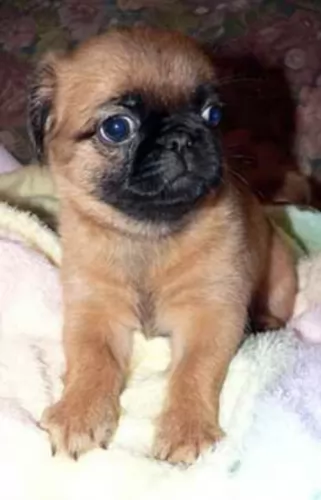 Like its two parental breeds, the Brug is a smaller sized dog – both parents are lab dogs and so is the Brug. Because they are hybrids, Brugs can be very different in appearance but most seem to have large eyes, squishy faces, black masks, fluffy hair, long black whiskers, short fluffy hair, flat ears and a fluffy tail. They could be in any of a number of colors including fawn, black, cream or apricot.
Like its two parental breeds, the Brug is a smaller sized dog – both parents are lab dogs and so is the Brug. Because they are hybrids, Brugs can be very different in appearance but most seem to have large eyes, squishy faces, black masks, fluffy hair, long black whiskers, short fluffy hair, flat ears and a fluffy tail. They could be in any of a number of colors including fawn, black, cream or apricot.
 A massive, powerful and muscular Molosser, the Bulgarian Shepherd is strong, agile, powerful and fast. They are intelligent and reliable. They have a long, thick, harsh coat in white with patches of black. Their skull is massive and broad with a furrowed forehead. The muzzle is massive as well while the nose has wide nostrils and is fairly large. It has close fitting, thick lips with strong, scissor bite jaws. The Bulgarian Shepherd’s eyes are deep, oblique and small. They are either hazel or dark. They have an intelligent and confident, yet firm almost grim expression.
A massive, powerful and muscular Molosser, the Bulgarian Shepherd is strong, agile, powerful and fast. They are intelligent and reliable. They have a long, thick, harsh coat in white with patches of black. Their skull is massive and broad with a furrowed forehead. The muzzle is massive as well while the nose has wide nostrils and is fairly large. It has close fitting, thick lips with strong, scissor bite jaws. The Bulgarian Shepherd’s eyes are deep, oblique and small. They are either hazel or dark. They have an intelligent and confident, yet firm almost grim expression.
Their ears are low set, small and v-shaped. They sit close to the head which sits on a powerful but short neck. They have a broad back, well-muscled body with a deep chest and long, rough tail. Their gait is a trot with a spring in their step. There are two types of coats – longhaired and shorthaired with no undercoats.
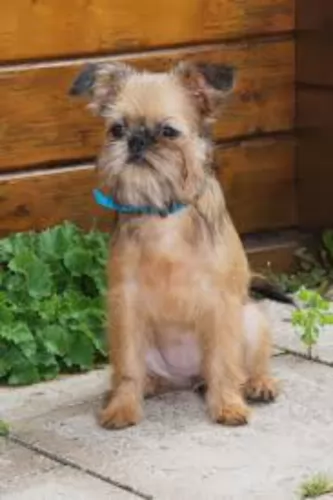 This hybrid is a loyal little dog. They are an affectionate lap dog that wants to be with his humans all the time. They have a very pleasant disposition and do well with children and other dogs. They might be shy to begin with but will warm up to affection. However, they are willful and self-important at times. This is tempered by their great sense of humor and empathy to its peoples’ moods. Left alone too long, they will tend to bark excessively.
This hybrid is a loyal little dog. They are an affectionate lap dog that wants to be with his humans all the time. They have a very pleasant disposition and do well with children and other dogs. They might be shy to begin with but will warm up to affection. However, they are willful and self-important at times. This is tempered by their great sense of humor and empathy to its peoples’ moods. Left alone too long, they will tend to bark excessively.
 This is a working dog, intelligent and independent guard dog. Reserved around strangers but loyal and devoted with his family. Tolerant of children in their family if they were raised with them. Not only will she defend human family members, she will guard and defend household pets as well. He is quite capable of making her own independent decisions. These are very intense guard dogs that will respond aggressively if they think their people are being attacked.
This is a working dog, intelligent and independent guard dog. Reserved around strangers but loyal and devoted with his family. Tolerant of children in their family if they were raised with them. Not only will she defend human family members, she will guard and defend household pets as well. He is quite capable of making her own independent decisions. These are very intense guard dogs that will respond aggressively if they think their people are being attacked.
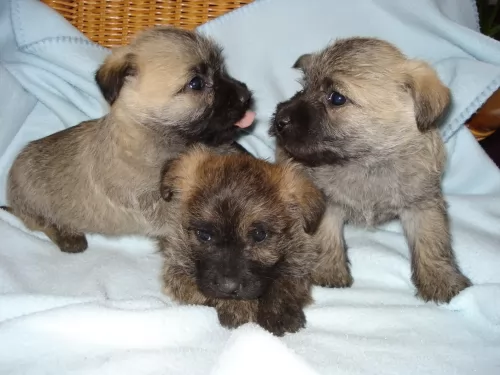 Usually the hybrid dog can have better health than either of the parents. This is true with the Brug as well, but there are also some issues they may inherit from the parents or face simply because of their size and complexion. These include:
Usually the hybrid dog can have better health than either of the parents. This is true with the Brug as well, but there are also some issues they may inherit from the parents or face simply because of their size and complexion. These include:
 The breed itself is known to be healthy but they do face some of the usual health issues of the massive, giant breeds. This includes knee and elbow dislocation; hip dysplasia; bloat; entropion and osteosarcoma. All of these conditions require medical intervention, but bloat and osteosarcoma are the deadliest. Bloat needs immediate attention and osteosarcoma is a deadly bone cancer.
The breed itself is known to be healthy but they do face some of the usual health issues of the massive, giant breeds. This includes knee and elbow dislocation; hip dysplasia; bloat; entropion and osteosarcoma. All of these conditions require medical intervention, but bloat and osteosarcoma are the deadliest. Bloat needs immediate attention and osteosarcoma is a deadly bone cancer.
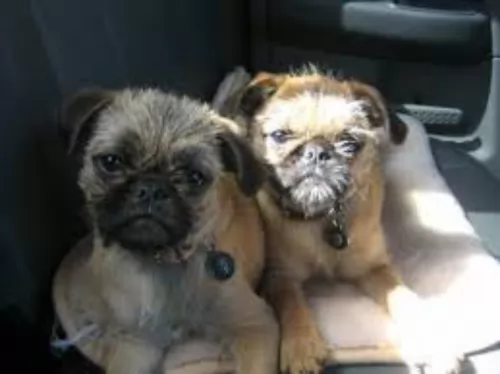 Don’t let this dog get overweight. Feed a high quality dry food intended for small or toy dogs. One fourth to one half of a cup per day in two separate meals is what is recommended.
Don’t let this dog get overweight. Feed a high quality dry food intended for small or toy dogs. One fourth to one half of a cup per day in two separate meals is what is recommended.
Patella Luxation or slipped knee caps – small dogs often have this issue. The patella is the knee cap and layman often called it a slipped knee cap, but it is also called slipped stifles. The femur, the tibia and the patella do not line up and this causes an abnormal gait or even lameness. Puppies are born with this, but it does not exhibit symptoms until years later. Arthritis is the most common result. Occasionally surgery is required.
Eye Issues – Cherry eye, a genetic disease, as well as irritation from air borne particles, allergies or scratches.
Skin Allergies – They can have skin allergies so watch for excessive licking or scratching.
Breathing Issues – Asthma and respiratory issues are common among small dogs with these types of faces.
Like their 2 breed parents, the Brug is a small but energetic hybrid. They need to play and run on a daily basis. Leash walks are good, but they need a yard or dog park as well. They are athletic little dogs and are good at tracking, obedience and agility. You cannot force them to do an activity but if its fun they will jump right in.
 These are large dogs with large appetites, but you want to keep them lean and active. Feed them at least twice a day with a high quality large or giant dog dry food. Four to five cups of food per day is the maximum.
These are large dogs with large appetites, but you want to keep them lean and active. Feed them at least twice a day with a high quality large or giant dog dry food. Four to five cups of food per day is the maximum.
Patellar Luxation – a floating kneecap or dislocated knee. Will cause lameness.
Osteosarcoma – bone cancer must be treated immediately as it is potentially fatal.
The Bulgarian Shepherd needs a good amount of exercise every day. Remember this is a working breed and they need a job. Long walks every day are essential for his well-being.